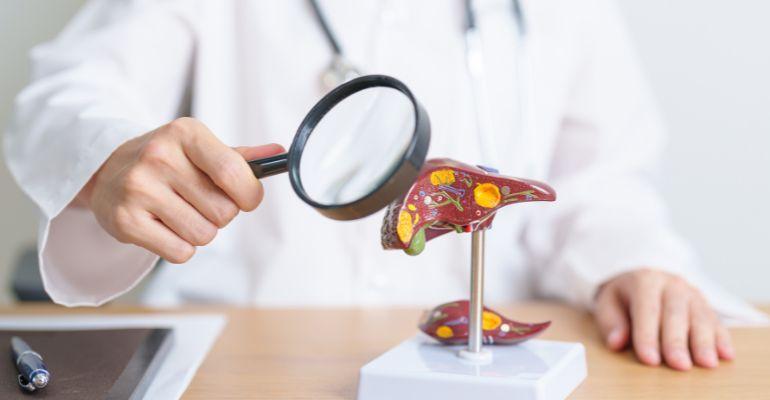Boehringer Ingelheim recently announced breakthrough results from a survodutide Phase II trial sub-analysis that demonstrate up to 64.5% of adults with fibrosis stages F2 and F3 (moderate to advanced scarring) achieved an improvement in fibrosis without worsening of metabolic dysfunction-associated steatohepatitis (MASH), versus 25.9% with placebo after 48 weeks of treatment [response difference: 38.6% (95% CI 18.1% - 59.1%), p=0.0005]. F2 and F3 patient populations are at increased risk of developing liver-related complications.
The full data results were presented at the European Association for the Study of the Liver Congress (EASL) 2024 and published simultaneously in The New England Journal of Medicine. The secondary endpoint shows that up to 52.3% of adults treated with survodutide (BI 456906) achieved a significant improvement in liver scarring (fibrosis) stages F1, F2 and F3 (mild to moderate or advanced scarring), versus 25.8% with placebo after 48 weeks of treatment [response difference: 26.5% (95% CI 8.37% – 44.66%), p<0.01].
The news follows data announced earlier this year when the trial met its primary endpoint. These results demonstrated that up to 83.0% of adults achieved a statistically significant improvement of MASH versus placebo (18.2%), reinforcing the potential of survodutide as a best-in-class treatment [response difference: 64.8% (95% CI 51.1% – 78.6%), p<0.0001].
Survodutide is a glucagon/GLP-1 receptor dual agonist with a novel mechanism of action, and the first to show this level of fibrosis benefit in a Phase II MASH trial after 48 weeks of treatment. The glucagon agonist component in survodutide has the potential to increase energy expenditure and has a direct impact in the liver, which could contribute to the improvement of fibrosis. The GLP-1 agonist component decreases appetite while increasing fullness and satiety.
“I am particularly excited about the findings of the Phase II trial in survodutide, which demonstrate the potential for glucagon agonism, in addition to GLP-1, to both improve MASH and shift the needle on fibrosis,” said Dr. Arun Sanyal, M.D., Professor of Medicine, Physiology and Molecular Pathology at Virginia Commonwealth University School of Medicine, and Principal Investigator of the trial. “These data position survodutide as a leading glucagon/GLP-1 receptor dual agonist that could be a game-changer for people living with MASH and clinically significant fibrosis.”
An improvement was measured as a decrease of at least one stage in fibrosis after 48 weeks of treatment in this trial. Fibrosis is a measurement of the progression of MASH, a progressive disease impacting more than 115 million people worldwide. MASH is caused by inflammation of the liver that can lead to fibrosis and severe tissue scarring (cirrhosis) can substantially increase the risk of end-stage liver disease and liver cancer. A liver transplant may be the only treatment option, which can place significant financial strain on healthcare systems. Liver fibrosis typically worsens slowly, and it is easy to go undetected if the fibrosis is not extensive. The reversal of liver fibrosis is often challenging for advanced stages of scarring and may not be possible for cirrhosis.
In this Phase II trial, survodutide also demonstrated significance versus placebo for all other secondary endpoints after 48 weeks of treatment. Actual treatment results showed that up to 87.0% of adults achieved at least a 30% relative reduction in liver fat versus 19.7% with placebo, as well as a relative reduction in liver fat content of up to 64.3% versus 7.3% with placebo. The absolute change from baseline in Non-alcoholic Fatty Liver Disease Activity Score (NAS, which is used to measure improvement in MASH) in actual treatment results was up to -3.3 with survodutide versus -0.4 with placebo.
“The breakthrough fibrosis results further reinforce survodutide’s potential as a best-in-class treatment for people living with MASH. We will advance quickly into Phase III trials,” said Carinne Brouillon, Head of Human Pharma, Boehringer Ingelheim. “New treatments are urgently needed for MASH, a disease connected with cardiovascular, renal and metabolic conditions like obesity, and we are excited to continue these important discussions with healthcare authorities.”
Survodutide is licensed to Boehringer Ingelheim from Zealand Pharma, with Boehringer solely responsible for development and commercialization globally. Zealand has a co-promotion right in the Nordic countries.
In this trial, survodutide demonstrated safety data consistent with GLP-1 based molecules, with no new safety data concerns. Survodutide was granted U.S. Food and Drug Administration (FDA) Fast Track Designation in 2021, and the European Medicines Agency (EMA) granted access to the Priority Medicine (PRIME) Scheme for MASH with fibrosis in November last year.
Survodutide is also being explored in five Phase III studies for people living with overweight and obesity, both of which are associated with MASH. An additional Phase III trial is evaluating if survodutide helps people living with overweight or obesity, with a confirmed or presumed diagnosis of MASH, reduce liver fat and lose weight.
References available on request





